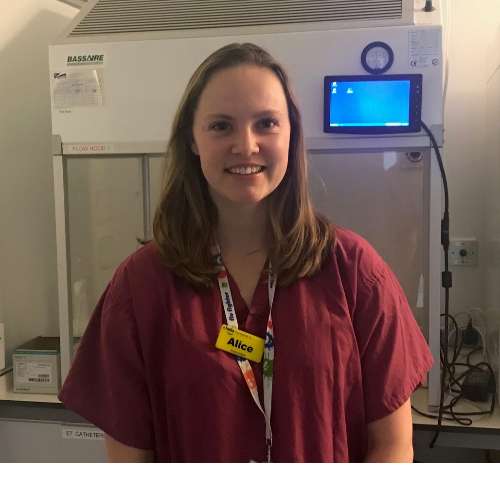Alice Royle graduated with an MSc Reproductive Medicine: Science and Ethics in 2017. She is now undertaking the NHS Scientist Training Programme to become a Clinical Embryologist
Why did you choose to study the MSc Reproductive Medicine: Science and Ethics at Kent?
I had completed the BSc Biomedical Science at University of Kent during which I completed my Research project in Professor Darren Griffin’s Lab. Through this experience I became interested in reproductive medicine which led me to research a career in IVF. After this research and a meeting with programme director, Professor Griffin, I decided to undertake the MSc. I liked the programme as I would gain a scientific background in Embryology and Fertility, complete a law module on the ethics in this field and be given hands on experience of embryology through a specific ‘IVF week’.
What aspects of the MSc did you find the most interesting?
I really enjoyed my lectures at Kent – a number of external experts delivered some of these and provide us with knowledge on what is happening in the field of IVF today. The Law module, which is shared with MA law students, was so interesting. It was a completely new experience for me, as a science student I had never attended a seminar, we just had lab sessions and lectures. The seminars we had with the law students often turned into ethical debates. This was a fantastic opportunity to gain more of an insight into what everyone else felt about some of the big ethical questions in the field of IVF.
I found my MSc Research project the most rewarding as I was able to work in an Andrology clinic in London learning skills which I now use in my job. The project has enabled me to attend a national conference and present my findings which won me a poster prize.
Did you get to do research as part of your degree?
Yes, I completed my MSc Research project on ‘Optimising protocols for Cryopreservation of Human Sperm’. This project was extremely rewarding and it greatly benefitted me in my future career. The work I carried out on the project was all performed clinically in the field of IVF so I gained hands on experience and competence.
What are the facilities like in the school and on campus generally?
The School of Biosciences have good facilities. For this MSc in particular the IVF laboratory meant I was able to gain practical experience of working in a lab similar to the clinical lab I now work in. Kent campus is fantastic, I love the fact it’s very green and the fact it is not too big. I played sports and used the excellent gym facilities a lot while at Kent. I liked how many eateries and bars there are on campus in order to socialise without always having to go into the town centre. The campus really felt like home while I was there.
What skills did you gain during your studies at Kent and how did the MSc affect your career prospects?
The MSc, along with work experience and my extra-curricular activities, allowed me to gain knowledge and skills that have led me to achieving my career aspiration of training to become a Clinical Embryologist. The MSc Research project in particular gave me the clinical skills and the work experience that gave me an advantage when applying and then starting my training. Without the MSc, the guidance from my lecturers and peers I met during my MSc, I would not be doing the job I do today.
What does your current role involve?
I am currently undertaking the NHS Scientist Training Programme to become a Clinical Embryologist. The training programme is 3 years and involves on the job clinical training, I work full time at Guys’ and St Thomas’ Hospital in London, along with a part-time Masters in Reproductive Science to provide me with the theory behind my work. My job involves helping couples and individuals with fertility problems. My job is extremely rewarding as I not only work in an IVF laboratory performing clinical tasks such as IVF, freezing gametes and semen analyses but I also get to speak to patients and answers their questions about their treatment.
What advice do you have for students considering this programme?
The MSc in Reproductive Medicine: Science and Ethics is a great stepping-stone into the world of IVF and provides you with the theory and some practical skills that you then need to apply in a clinical setting to achieve a career in the field of embryology. I would advise students to use their free time wisely on the MSc to research the field and gain work experience if they desire to become an Embryologist.

